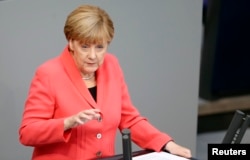European leaders have pledged more than $1 billion to help Syrian refugees in the Middle East, in an attempt to stop the flow of migrants arriving on the continent’s southern shores. But big differences remain over what to do with the migrants who have already arrived.
In the early Fall rain on the border between Croatia and Serbia, Idriz Besic, a local imam leads prayers for the Muslim festival of Eid for thousands of refugees and migrants.
He describes the dangers of the migrants’ path through the Balkans.
He says the worse thing is that a lot of families are missing members. They are missing children, wives, brothers. "The situation is terrible," he said.
Slowing the flow
European leaders are scrambling to find a way to stem this flow. After an emergency meeting Wednesday, the EU pledged $1.1 billion for the United Nations and other aid agencies to help Syrians in the Middle East.
Leaders also agreed on closer cooperation and tighter border controls.
"It is clear that the greatest tide of refugees and migrants is yet to come. Therefore we need to correct the policy of open doors and windows,” said European Council President Donald Tusk.
Some EU states have accused Germany of stoking the crisis by offering to accept hundreds of thousands of refugees.
Speaking to the German parliament Thursday, Chancellor Angela Merkel took a tougher line.
Chancellor Merkel said "what Europe needs is the effective repatriation of those people who are not entitled to protection in the European Union."
Partnership
She called on Europe’s allies to help tackle the conflicts that are the root cause of the crisis.
Chancellor Merkel said that can only happen with the support of our trans-Atlantic partners, the United States, as well as with Russia and the states of the region of the Middle East.
A plan to redistribute 120,000 refugees across member states is facing a legal challenge from Slovakia. Up to a million asylum seekers are expected to reach Germany alone this year.
“It is primarily a refugee crisis, not a migrant one," said Andrej Mahecic, spokesperson for the U.N. refugee agency (UNHCR).
"The vast majority of those who are coming across the Mediterranean, especially this year, are Syrians, Afghans, Iraqis. Eighty percent of all arrivals to Europe this year are coming from the refugee producing countries.”
Refugee groups warn that Europe is far from agreeing a long-term solution - as deep divisions between member states still remain.














